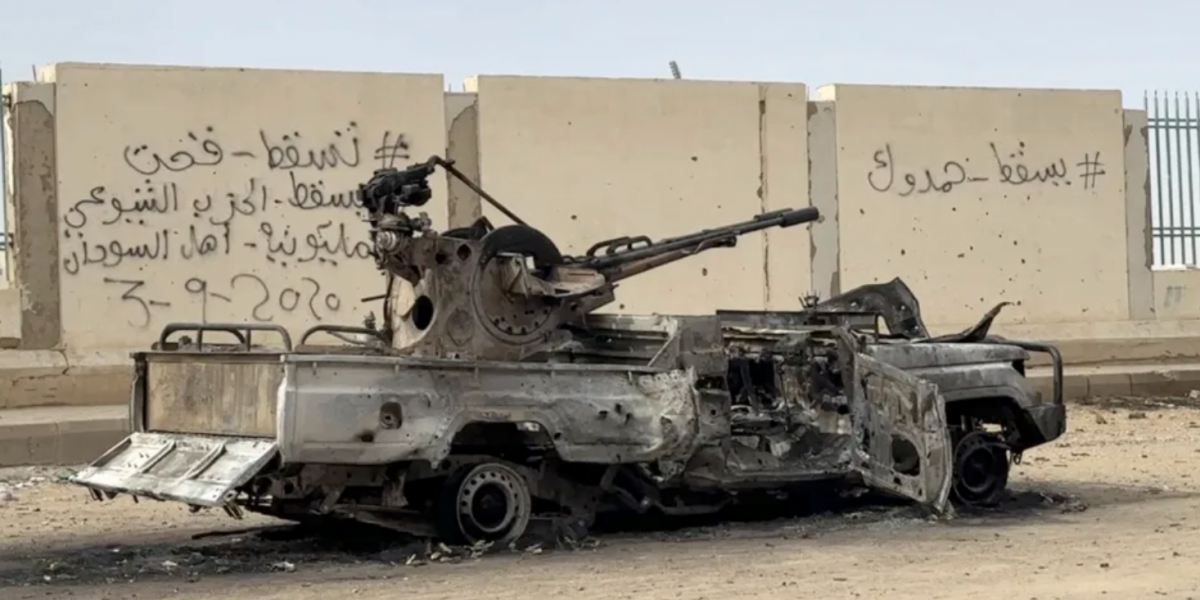In mid-April, citizens in Sudan as well as Sudanese across the diaspora, woke up to the news that violent clashes had begun between the Sudanese army and the paramilitary Rapid Support Forces (RSF) in the capital of Khartoum.
These two groups had not too long ago shook hands and conspired together to derail the democratic transition, by staging a military coup in October of 2021, which ousted the civilian component of the transitional government. In fact, throughout the former dictator Omar Al-Bashir’s reign, the army and Rapid Support Forces often worked in tandem to inflict violence and terror on marginalized communities such as in Darfur and the Nuba mountains, as well as to quell any anti-government activity or resistance.
Power struggle amongst armed forces
Now, having found their greed too large to be satisfied by a power-sharing agreement, the Head of the Transitional Council and Commander in Chief of the Armed Forces, Abdel fattah Al-Burhan, and the previous (now removed from his post) Deputy of the Transitional Council and Leader of the Rapid Support Forces, Mohammed Hamdan Dagalo, have turned their forces against each other in order to secure total control.
Both Dagalo and Al-Burhan desire a level of totalitarian control akin to Bashir, the very sort of authoritarian structure that led hundreds of thousands of Sudanese citizens out in protest in 2019. Their war is one of greed, control, and corruption with Sudanese civilians ultimately paying the price. Since the outbreak of war, Khartoum has been under siege by the two generals with civilians losing their lives in the crossfire, prevented from accessing medical services, having their homes broken into, being subject to sexual and physical assault, as well as being displaced from the only homes they have ever known. In areas that receive lower levels of media attention, such as Al-Ginenia in Darfur, entire villages and essential facilities have been destroyed, and hundreds of people have been victims of indiscriminate violence and displacement.
The situation in Sudan is catastrophic, and threatens the very existence of the country. The most significant international mediation effort to date has been the launch of the Jeddah negotiations in early May, which was hosted by the U.S State Department and the Saudi Foreign Ministry. Representatives of both the army and RSF were brought together in an attempt to establish a declaration of commitments that would protect civilians and safeguard humanitarian efforts.
The Jeddah negotiations brokered a ceasefire in late May, which although they claimed was ‘mostly adhered to’, made no tangible difference in the lives of Sudanese civilians as fighting, looting, and violence continued throughout. Both the U.S and Saudi Arabia have claimed that they are ‘gravely concerned’ about the situation in Sudan, and are dedicated to protecting civilians and returning Sudan to stability. But both the U.S. and Saudis have long had ties to the Sudanese military and RSF.
Sanctioning the SAF and RSF
The elephant in the room that no one seems to want to mention: the lack of any targeted sanctions or freezing of foreign assets of both parties. It seems ineffective to rely primarily on mediation efforts, when both sides have repeatedly failed to adhere to any national or international agreements made in the last two years. How can you earnestly expect an army and paramilitary force to come to an agreement when they have made it abundantly clear they desire complete political control? When the very purpose of their existences is to intimidate, kill, and control?
As with most wars, money is the lifeline. Thus, any regional and international effort aimed at stopping the war which does not include a restriction on the cash flows of both generals and their networks, will almost surely fail. Through money laundering and illicit financial flows, both Dagalo and Burhan are able to bolster their political influence and control over state resources, and also become valuable allies to regional players who are willing to turn a blind eye in exchange for commodities, particularly gold.
The United States arguably has the most significant role to play, as it could be successful in putting a significant dent in the general’s financial flows through placing restrictions on companies and firms connected to the Rapid Support Forces and Sudanese army. Furthermore, the U.S can apply pressure on banks and financial institutions where forces complete their banking transactions and activity for more transparent reporting. On June 1, the U.S Department of the Treasury’s Office of Foreign Assets designated four companies generating revenue from, and contributing to, the violence in Sudan and imposed sanctions on their activities. But this minor sanction alone will do little to dissuade the SAF and RSF.
When looking at the structures of both the SAF and RSF, it becomes clear that their access to money and valuable commodities is the fuel for their continued destruction, corruption, and greed. Both forces are able to recruit soldiers from vulnerable areas through their promise of wealth and attractive salaries given in U.S dollars. Putting a dent in their cash flows could deter many of their soldiers from fighting, and force them to recalibrate their strategies. Although mediation efforts are vital and incredibly valuable, in a country where violent kleptocracy has been the norm, divorcing corrupt structures from access to money is the most important way to cut off their tyranny.
The SAF and the RSF colluded to derail the democratic transition and stifle the revolution in Sudan. Now, their current power struggle further threatens the very existence of the country. Furthermore, it pushes the revolutionary leaders and resistance committee members out of the political space, and squashes the hopes of many who dared to dream of a better future for the country.
Please consider donating to these vetted links, which a help provide much needed humanitarian assistance to those affected by the violence in Sudan:
Did you like this article? Help us produce more like it by donating $1, $2, or $5. Donate

